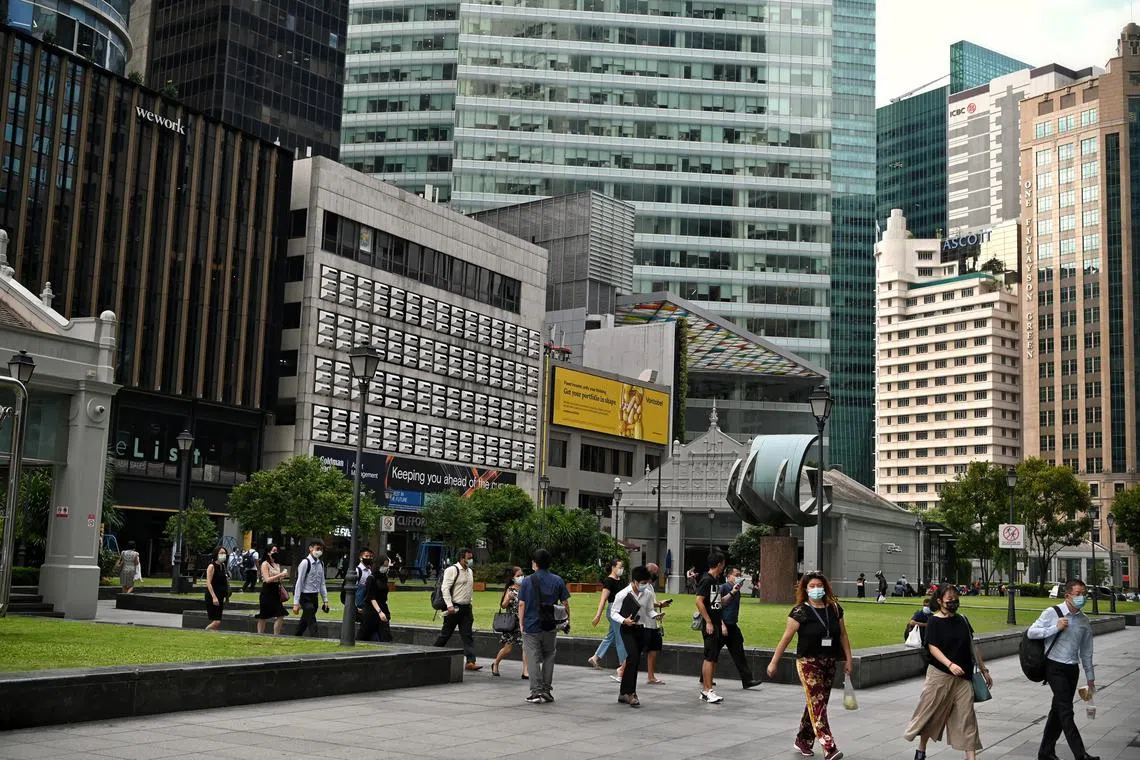Rollbacks in flexi-work likely to taper off in Singapore: Experts
Sign up now: Get ST's newsletters delivered to your inbox

Nearly half of more than 1,000 Singaporeans surveyed in June said they had resumed a five-day work week in the office, though four in five prefer some form of flexible work.
PHOTO: ST FILE
SINGAPORE - The time saved in not commuting to the office has allowed accountant Kenneth Wong the flexibility to complete personal errands more efficiently while remaining productive at work.
Mr Wong, 29, who has been working from home since the Covid-19 pandemic began, said: “I get to rest more during lunchtime, possibly head out for errands, such as getting a haircut, and save more money by eating my mum’s cooking.”
Although his company now encourages employees to work in the office twice a week, it is not mandatory, and Mr Wong is holding out for the time being, having settled into the work-from-home routine.
Some other employers, meanwhile, have rolled back prevailing flexible work arrangements further by mandating a return to office for much, if not all, of the work week.
Big names that have done so, despite a slew of studies indicating the dividends on employee engagement, include investment bank Goldman Sachs and social media giant Twitter.
Nearly half of more than 1,000 Singaporeans surveyed by UOB in June said they had resumed a five-day work week in the office,
“Since the stabilisation of the pandemic, more companies in Singapore have begun to ask their employees to return to full- or near full-time office work,” said Ms Kirsty Hulston, regional director at recruitment firm Hays Singapore.
Getting everyone back at work physically improves the onboarding experience for new hires and helps them identify more with the organisational culture, said Dr Rashimah Rajah, a lecturer at the National University of Singapore Business School.
“Roles that require more high-quality communication with other stakeholders such as employees and clients, like (roles) in human resources, sales and consulting, would benefit from working in office,” added Dr Rajah.
Economic headwinds have also tempered employer optimism in flexi-work, with 80 per cent of executives in Singapore reporting that the economic climate could force them to pull back on flexible work and other benefits, according to a poll published in November by professional networking platform LinkedIn.
Over a third of the respondents are considering cutting employee learning and development budgets, as well as flexible and hybrid working roles.
A study by professional services firm Aon, which was published in November, showed that 55 per cent of more than 500 employers surveyed across the Asia-Pacific said the top challenge they faced was increased spending on employee benefits.
Yet, flexi-work will likely remain the norm in Singapore, given the tight labour market, in which employers are jostling to attract and retain talent, said Associate Professor Tan Hwee Hoon of Singapore Management University.
“Until and unless the job market becomes an employers’ market again, flexi-work will become the norm,” added Prof Tan.
Dr Rajah said: “Ultimately, if the pre-existing relationships within the company are good, and if there is trust within the organisation, I don’t foresee flexible work arrangements being under threat.”
She added that companies may balance building trust and working relationships with providing flexibility by asking new hires to work in the office for the first six months before transitioning to a flexible work arrangement.
“If there is a rollback on flexible arrangements, then the focus on the other types of incentives needs to increase,” said Dr Rajah, citing upskilling opportunities, financial incentives and better healthcare as examples.
One firm that is intent on retaining the hybrid approach is tech firm Adobe, said Mr Simon Dale, its managing director for South-east Asia and Korea.
All 180 employees in Singapore were encouraged to work from home at the peak of the pandemic. While the firm has gradually reopened its offices, employees here still do not have to spend a mandated minimum amount of time in the office.
Rather, employees are encouraged to commute to office purposefully for tasks and meetings that would benefit from their presence, rather than just for the sake of showing up.
Nonetheless, Mr Dale said: “Team-bonding activities, employee townhalls and other in-office engagements in place to encourage and support office working, we believe, have driven an increase in the proportion of office working since April.”
Despite being comfortable with working from home, Mr Wong said he would not be opposed to a mandated return to the office, even for five days a week, as he was used to working in the office before the pandemic.
“It’s still easier to ask questions and learn things from colleagues face to face. So it’s all a game of trade-offs.”


